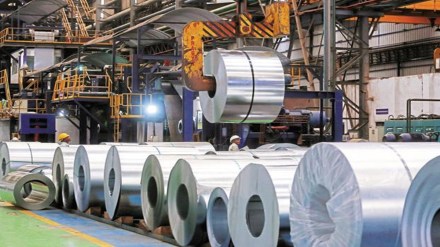The government has issued a formal notification initiating a probe into the dumping of certain alloy and non-alloy steel products into India for imposing safeguard duties.
The products singled out for the probe include Hot Rolled (HR) coils, sheets and plates, HR Plate Mill Plates, Cold Rolled coils and sheets, and Metallic Coated Steel coils and sheets.
These products are used in general engineering and fabrication, pipe manufacturing, construction, capital goods, automotive industry, bicycles, appliances, furniture, electrical panels, packaging, drums, renewable energy and barrels.
The notification by trade defence body Directorate General of Trade Remedies (DGTR) initiating the probe was issued on a complaint by the Indian Steel Association on behalf of its members who include ArcelorMittal Nippon Steel, JSW Steel, Bhushan Power and Steel and Steel Authority of India.
The DGTR has given 15 days to exporters, importers and users in India to file their response for the investigation.
In their application the producers had stated that there is a recent, sudden, sharp and significant increase in imports of these products which is causing serious injury to the domestic industry. The applicants further claim that the increased imports also pose a further threat of serious injury.
User industry says that if the safeguard duty is imposed post investigation it will lead to increase the cost of these products having wide applications. The increase in prices of raw material can lead to higher imports of finished products and even hurt exports from Micro, Small and Medium Enterprises, chairman of Engineering Export Promotion Council Pankaj Chadha said.
Engineering sector accounts for a quarter of total exports from the country. Around 60% of the engineering goods exporters are in the MSME sector and they account for half of the sector’s exports by value.
Commerce ministry officials had recently said that the interests of the MSMEs would be kept in mind while deciding on the safeguard duties. Sources say that in a meeting of user industry and producers with top officials of commerce and steel ministry some ideas for protecting MSMEs were discussed.
One of the proposals put forward by producers was providing steel to the MSMEs at the prices at which they export. The representatives, however, point out that most of the units cannot buy directly from the producers as their requirements are not that large.
To back their argument the producers have pointed out the existence of significant excess capacity far exceeding domestic consumption in China, Japan and South Korea. They said China’s recent domestic policy measures resulted in a decline of consumption of long steel products that are mainly used in the real-estate sector. To mitigate the decline in steel consumption in long products, Chinese steel companies shifted a significant percentage of their production from long products to flat products, which are being exported to global markets.
Their application also pointed out that Association of Southeast Asian Nations (ASEAN) is expected to significantly increase crude steel production capacity, with 75% of the region’s planned capacity expansion related to investments by Chinese companies. This excess production could find its way to India.
ASEAN is the top region among cross-border investments by Chinese steel companies who are investing heavily in steel projects abroad and the capacity in ASEAN is expected to increase to levels that far exceed the region’s steel demand.
